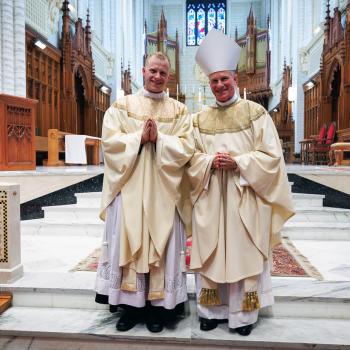Indo-European Ties
Many Druids have become aware of the full Indo-European spectrum of history and religion. The Dharmic paths have many similarities with the ancient Celtic teachings and ways. Offerings to sacred Fire and sacred Water, triple deities, High Gods associated with thunder, lightning, and oaks, and Sanskrit words embedded in Celtic languages are just a few of the similarities that point to a common spiritual heritage.
In October 2009 I was honored to present a paper on Celtic Cosmology at the ICCS Conference on Spirituality in Indigenous Cultural and Religious Traditions, in the Washington, D.C. area. The conference was held at a Hindu temple and it was exciting to explore the spread of Harappan and Vedic culture from the East into Western Europe with Hindu scholars.
This October (2010) OBOD is sponsoring The One Tree Gathering in Birmingham, UK, at the Shri Venkateswara Hindu Temple. This gathering will also explore the connections between Druidism and the Dharma.
Many Druids are reading the Rig Veda, the Upanishads, the Laws of Manu, the Bhagavad-Gita, the Ashtavakra Gita, and other Vedic texts in an effort to learn the ancient philosophy that may have informed the religion of the Druids. In future this kind of mutual exchange between Hindus and Druids should become more frequent.
Druid Clergy
As with any religion, Druids are actively training clergy, developing ritual forms based on actual Celtic precedent, and establishing standards of religious education for lay folk and clergy alike. A major problem is that while the Druid community clamors for public and private religious rites and educated clergy to lead them, they are still not prepared to compensate said clergy for all their years of study and the time required organizing gatherings and rituals.
At this moment in history many Pagans are still in the throes of leaving the religion of their childhood behind and seeking to create their own spiritual path without the intervention of priesthood and without the paying of regular tithes. Yet modern Pagans still want and expect clergy to be there for their life passages such as births, baptisms, hand-fastings, funerals, and seasonal rites.
Pagans want experienced ritual leaders who will offer their homes as a free teaching and ritual space and they also want competent instruction and well-written articles and books. There are many generous clergy who labor for years with no compensation and a huge eventual burn out rate as a result.
Pagans will cheerfully spend their money on jewelry, robes, and entertaining regional festivals, yet somehow it is still seems immoral to pay for clergy and clergy services. In the future this will have to change. Only when Pagans begin to contribute regularly to their religious groups will it be possible to have Pagan hospice services, Pagan cemeteries, Pagan schools, and Pagan old age homes. These things are vitally needed.
Isn't Druidism a Nature Religion?
As a culture we are growing more and more anxious about the state of the Earth. As I write this article, a volcano of oil and gas is still spewing from the ocean floor of the Gulf, thanks to the negligence of British Petroleum and other oil related corporations. Every day the Earth grows warmer, more species are lost, and cancer rates continue to rise.
Along with ethical and religious scholarship, Druidism provides a context for modern Europeans and those of European ancestry to reconnect with their own ancient tribal reverence for nature (indigenous peoples all over the world have never stopped doing this), within a context where listening to the animals and the winds, to the voices of the fire, trees, and waters is taken seriously.
When we as a people learn to listen once again to the voices of nature we will open our hearts to Her and reconnect with Her creatures as aspects of the divine. If we see the Earth and Her creatures as sacred beings in their own right we will be more likely to work toward their preservation.
The Order of Whiteoak (Ord na Darach Gile) has begun to talk about "Organic Druidism" and "Bio-regional Animism" in a Celtic context. We are looking for ways to engage with and more deeply feel into and support our own bio-regional habitats -- forests, deserts, oceans, mountains, streams, lakes, and ponds. We are looking for ways to deepen our sense of belonging within the watershed areas in which we live by connecting with the ancient Spirits of Place.
Our ultimate aim is to view ourselves as the custodians of our own little patch of planet, exquisitely aware of the plants, animals, and unseen beings that live there. As this awareness becomes more acute, Druids are organizing activities such as tree plantings and trash removal from wild places, and notifying each other of other opportunities for service to the remaining wild.




